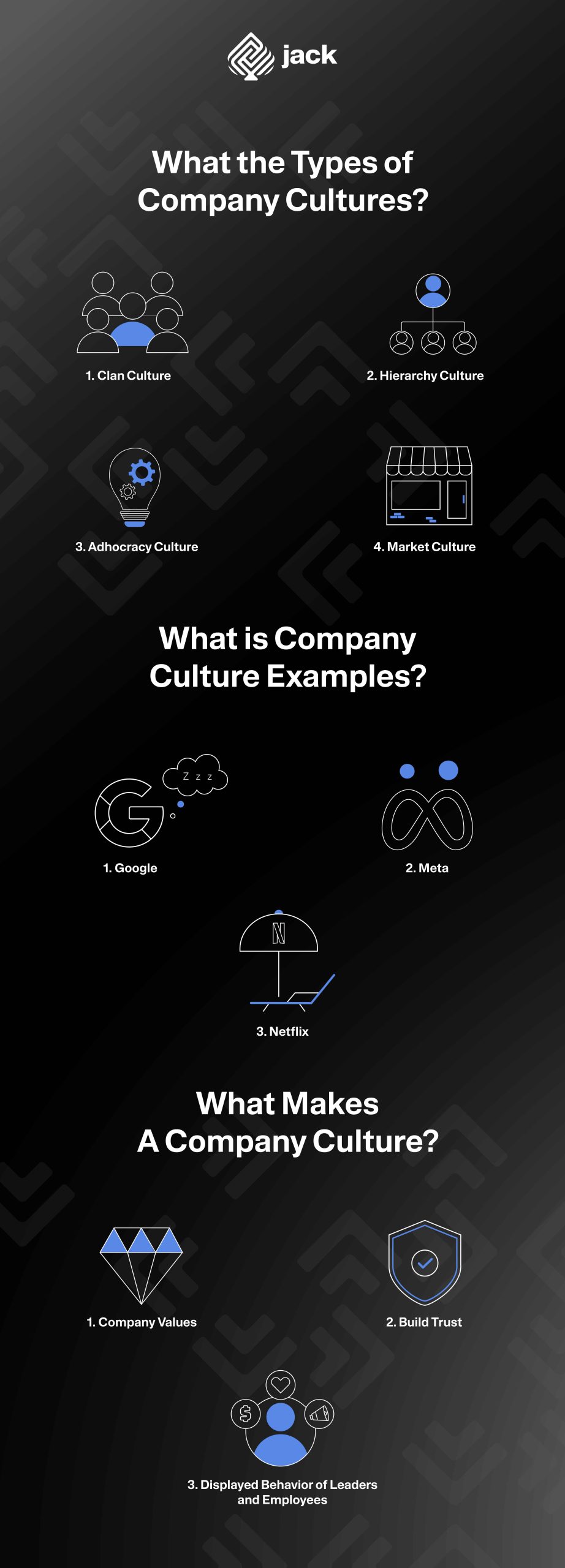It’s not just about responsibilities, salaries, or career paths; discussions about the working world also revolve around its culture.
In a company, the work culture plays a role as a pathway for both employees and employers to achieve the company’s goals.
Therefore, an ideal company should have a work culture that can provide harmony in every company activity through the company’s vision and goals sustainably.
What are the Types of Company Cultures?
Every company has its own unique work culture. Generally, there are four types of work cultures that are commonly used by several companies, including:
1. Clan Culture
Clan culture work is usually found in small companies, startups, or family-run businesses. This culture emphasizes an interpersonal, collaborative, and communicative work environment to create a company that resembles a large, happy family.
How is it done?
This can be achieved by eliminating vertical relationships between employees, and creating a more open work culture for various ideas.
2. Hierarchy Culture
Unlike clan culture, hierarchy culture work emphasizes a more formal and structured work concept. Additionally, this work culture focuses on the development and maintenance of rules, structures, and stable organizational processes by implementing a hierarchical system of authority and management.
Adherents of this work culture believe that clarity in roles and responsibilities can make coordination among company employees more efficient. Therefore, this work culture is suitable for employees who seek to work in companies that value role clarity and stability.
3. Adhocracy Culture
Adhocracy work culture is a work culture that encourages employees to continuously innovate, take initiative, and be willing to take risks in navigating their work activities.
This means that all employees, without exception, are free to express fresh ideas to advance the company. The advantage of an adhocracy work culture is the cultivation of individual professionalism for quality results.
Usually, this work culture is embraced by companies that prioritize dynamic and visionary principles, such as technology companies.
4. Market Culture
Market culture is a type of work culture that emphasizes targets and deadlines to achieve the company’s expected results. Therefore, employees working in this type of company will be closely monitored to achieve the company’s desired targets.
This work culture is suitable for ambitious employees who are looking for companies that can help them develop professionally. Some companies that implement a market culture work culture are Tesla and Amazon.

Examples of Company Culture Implemented by Large Corporations
To provide a clear overview of company culture implementation, here are some examples of cultures from various companies around the world:
1. Google
Besides being recognized as the best company in the world, Google is also known for having a good work culture.
The company is considered a pioneer in implementing a relaxed working style. If you think this working style makes employees lazier, you’re mistaken. In reality, the relaxed working style actually allows Google employees to feel more freedom in expressing their ideas and showcasing their best potential.
2. Meta
Meta is a company that implements a competitive yet comfortable work culture.
Similar to Google, Meta is also considered a company that practices the best work culture. This is supported by a survey conducted by PayScale, which showed that 93% of Meta employees are very happy and satisfied working at the company. This is because employees are given the freedom to provide criticism and suggestions to their managers.
3. Netflix
Netflix highly values flexibility, honesty, and openness. Interestingly, this work culture is instilled in the company starting from the employee selection phase. For Netflix, employees with good morals are far more valuable than individuals with excellent skills but have poor morals.
The implementation of flexibility at Netflix is done by providing employees with long vacation time to encourage flexible and optimal work scheduling.
Meanwhile, the values of honesty and openness are promoted by encouraging employees to be open with one another and honest in expressing their thoughts, including with superiors.
Inspirational Examples of Company Culture
One of the best examples of company culture that is often followed is the culture implemented by the technology company Google. Google’s company culture is known for its innovative, collaborative, and creativity-supportive approach while maintaining a relaxed working style.
They encourage employees to think outside the box and take risks in finding new solutions, while still prioritizing work-life balance by providing free time and a relaxed working environment.
In addition, Google also embraces an inclusive and diverse culture that supports collaboration between teams and knowledge sharing, without compromising fairness in decision-making.
Google’s company culture is also reflected in various activities and programs they offer to employees, such as employee training and development, transparent reward programs, and attention to employee well-being. All of these contribute to creating a positive, productive, and motivating work environment.
This company culture is considered one of the best examples of successful company culture and has been adopted by many other companies.
Why is Company Culture Important?
Company culture refers to a set of values, norms, beliefs, and practices that define the unique characteristics of a company. Therefore, company culture plays a crucial role in the success and performance of a company. Here are some reasons why company culture is highly important:
1. Identity and Shared Values
Company culture helps create a strong company identity and sets it apart from other companies. The values embedded in the company culture serve as a guide for behavior and decision-making at all levels of the organization. A strong and clearly defined culture helps identify shared goals and fosters trust among employees.
2. Increased Productivity and Performance
A positive and inclusive culture motivates employees to contribute their best and work with enthusiasm. When employees feel valued, motivated, and have a sense of ownership in the company, they tend to be more dedicated and productive. A good company culture also supports collaboration, innovation, and effective problem-solving, ultimately enhancing the company’s performance.
3. Retention and Attracting Quality Employees
A positive and appealing company culture can be a magnet for attracting high-quality employees. Potential employees often seek companies that align with their values and offer a conducive work environment. By having a strong and positive company culture, a company has a better chance of attracting and retaining top talents in their industry.
Overall, a company’s culture has a significant impact on performance, productivity, employee retention, innovation, and the company’s ability to adapt. A good culture creates a positive, collaborative, and motivating work environment, which in turn helps the company achieve its long-term goals and differentiate itself in the market. That is why company culture is important.
4. Achieving Company Goals
Company culture is part of the company’s strategy that can guide the company toward achieving the goals stated in its vision and mission.
To accomplish this, comprehensive support from management and employees is crucial. This is done by aligning views, spirit, and daily work behavior to achieve the company’s vision and mission.
Here is where workplace culture plays a role, which is to align the vision, mission, values, and commitment of all employees, and to encourage changes in employee work behavior according to the established values.
What Creates a Strong Company Culture?
The establishment of a strong work culture is not separate from clear values, which are the directions and guidelines set by the company to be followed by employees. One example of implementing these values is consistent leadership.
Additionally, effective communication ensures a good understanding of the company culture and employee participation in enhancing their sense of ownership and engagement in the company, thus contributing to a strong company culture.
By combining the above points, a strong work culture can be created, which undoubtedly has a positive impact on both employees and the company itself.
Stages of a Leader in Creating Company Culture
Building a strong and positive company culture certainly requires a series of important steps to shape and reinforce the values, norms, and uniqueness of the company.
The first step in building a company culture can be done by reflecting on and understanding the company’s values. Company values are the two or three words that customers should think of when they hear the company’s name. Therefore, it is important to carefully consider which values to choose. This can be done through research and analyzing the results to identify the core values that the company wants to instill and uphold. In this process, stakeholders such as founders, senior management, and employees must be involved to achieve a consistent understanding and strong agreement on the company’s values.
Next, set realistic goals for the company culture. This means that the goals of the company culture should be related to diversity, inclusion, and shared values. Founders of the company need to remember why they started the company and what they want to achieve. The work culture should reflect ideas that align with those goals.
The next step is to communicate the company culture to employees. Clear and consistent communication about company values helps build shared understanding and provides guidance on expected employee behavior. This can be done through direct communication, team meetings, training, and the development of effective communication materials.
Furthermore, the work culture is also formed by the actions of company leaders on a daily basis. This means that leaders will always be a reflection of the company’s values both internally and externally. Therefore, company leaders not only need to articulate the company’s mission statement but also need to exemplify what the company stands for.
The next stage is the implementation by the agents of the company culture, which are the employees. It is also important to ask employees about what they like and dislike about the implemented work culture, why work culture is important to them, and how they provide feedback on the work culture that has been implemented. In this way, company leaders can also assess whether adjustments to the current work culture are necessary or not.
Lastly, building a company culture also requires the existence of structures and systems that govern rewards and punishments for employees who adhere to or disregard the values contained within the company culture. Generally, this is also part of individual employee performance evaluations and unit assessments.
What Makes a Company Culture?
A company culture is formed through complex interactions among various interconnected elements, including:
1. Company Values
Company values serve as the foundation for shaping the company culture as they reflect the principles considered important by the company, such as integrity, collaboration, innovation, and customer service. These values will form a moral and ethical framework for the behaviors and decisions made by employees within the company.
2. Built Trust
The trust established between leaders and employees also plays a crucial role in shaping the company culture, where individuals feel valued, heard, and able to contribute with confidence. This fosters effective collaboration and strengthens bonds among team members.
3. Displayed Behavior of Leaders and Employees
The behavior displayed by leaders and employees also influences the formation of company culture. When leaders practice the values and set a good example, it establishes a pattern of behavior that is followed by other employees. When employees exhibit behavior aligned with the desired culture, it consolidates and strengthens the company culture.
See Tutorial Account Verification Jack
How to Improve and Maintain Company Culture?
Improving and maintaining company culture is an ongoing effort to ensure consistency and relevance of the culture amidst changing business environments.
To enhance and maintain company culture, there are several important steps you should take:
Firstly, leaders should be role models, particularly in practicing the desired values of the company culture. They should consistently demonstrate behaviors that align with the culture of the employees.
Next, leaders should possess good communication skills, especially in conveying the values, goals, and expectations of the culture to all employees. This enables employees to understand and apply the company culture effectively.
Another way to improve company culture is by providing recognition and appreciation to employees who have achieved specific targets. This can motivate employees to remain committed to the desired culture and strengthen the bond between employees and the company.
Companies also need to provide relevant training and development opportunities for employees. This will help them better understand and internalize the company culture while strengthening the skills required to work in alignment with that culture.
See also video tutorials from financial and business from Jack.
Use Jack for your business needs
Lastly, maintaining company culture should involve regular feedback to employees and listening to their input regarding the current implemented culture. This allows the company to continuously improve and reinforce the existing culture to remain relevant and deliver the desired values.
Hopefully, the information about company culture in this article is useful to you!






